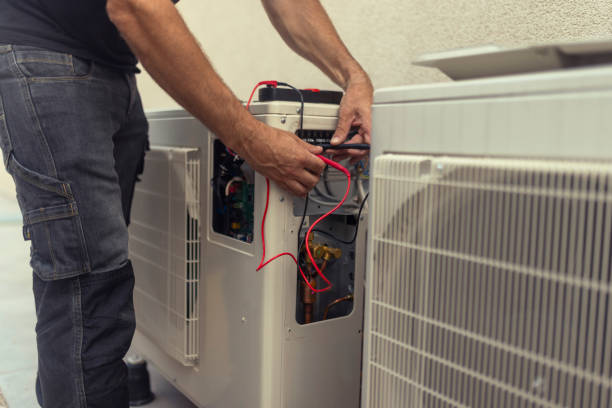Emergency Heat Pump Repair in Temple Terrace, FL

When your heat pump fails in Temple Terrace, immediate comfort is compromised. We provide rapid, 24/7 emergency heat pump repair services to restore your system. Look for critical signs like loud noises, ice buildup, constant running, or being stuck in one mode, all demanding urgent attention. Our process involves thorough diagnostics, clear explanations, and expert repairs with quality parts. We also offer honest guidance on whether repair or replacement is the most sensible long-term solution for your home's climate control.

Emergency Heat Pump Repair in Temple Terrace
When your heat pump fails in Temple Terrace, your home’s comfort is immediately compromised. Whether you’re left without cooling during a sweltering Florida summer day or without heat on a surprisingly cold winter night, a broken heat pump constitutes a true emergency. These sophisticated systems are your year-round climate solution, and their sudden failure requires an urgent, expert response. Waiting to address the problem not only prolongs your discomfort but also risks turning a manageable repair into a catastrophic system failure. We provide rapid, 24/7 emergency heat pump repair services designed to restore your comfort and protect your investment with precision and speed.
Signs Your Heat Pump Requires Immediate Emergency Service
A complete system shutdown is the most obvious sign of trouble, but other subtle symptoms can signal an impending emergency. Acting on these early warnings can prevent more extensive damage. Be aware of these critical indicators:
Your System is Stuck in One ModeA unique feature of a heat pump is its ability to both heat and cool your home. This is controlled by a component called the reversing valve. If your system is blowing cold air when you’ve set it to heat, or warm air when it should be cooling, the reversing valve has likely failed. This requires immediate professional attention to restore its dual-function capability.
Loud, Alarming NoisesYour heat pump should operate with a consistent, low hum. Sudden, loud noises are a clear sign of mechanical distress.
- Grinding or Metal-on-Metal Screeching: This often indicates failing motor bearings or a problem with the compressor. Shut the system down immediately to prevent the compressor from seizing, which is one of the most significant repairs a heat pump can face.
- Banging or Clanking: This could mean a loose part, such as a fan blade or connecting rod, is hitting other components inside the unit.
Significant Ice Buildup on the Outdoor UnitWhile a thin layer of frost can be normal during the heating cycle in cold weather, thick ice encasing the outdoor unit is a serious problem. This points to a failure in the defrost cycle, low refrigerant levels, or restricted airflow. If left unaddressed, this ice can damage the fan blades, crush the delicate coil fins, and severely strain the compressor.
The System is Constantly Running or Short CyclingA properly functioning heat pump runs in cycles to maintain your desired temperature. If your unit is running continuously without reaching the thermostat setting or turning on and off every few minutes (short cycling), it’s a sign of a critical issue. This could be caused by a refrigerant leak, a malfunctioning thermostat, or an oversized or undersized system, all of which drive up energy costs and put excessive wear on components.
Circuit Breaker Keeps TrippingA circuit breaker is a safety device. If your heat pump repeatedly trips the breaker, it’s signaling a dangerous electrical fault within the system. This could be due to a shorted wire, a failing motor, or a grounded compressor. Do not repeatedly reset the breaker; this is a fire hazard that demands an immediate professional diagnosis.
Our Comprehensive Emergency Repair Process
When you’re facing a heat pump emergency, you need a clear, efficient, and thorough process that gets you from crisis to comfort. Our approach is built on expertise and transparency.
First, our technicians perform a complete diagnostic assessment. This goes far beyond a surface-level inspection. We use specialized tools to meticulously test refrigerant pressures, inspect all electrical components like capacitors and contactors, check the functionality of the reversing valve, and verify that the defrost controls are operating correctly.
Once the root cause of the failure is identified, we explain the problem to you in clear, understandable terms. We’ll show you what has failed, why it failed, and outline the exact steps required for the repair. Our goal is to empower you with knowledge about your system.
With your approval, our certified technician will perform the necessary repairs using high-quality, durable parts. Our service vehicles are stocked with a wide range of common heat pump components, enabling us to complete most emergency repairs in a single visit. Whether it’s replacing a faulty fan motor, repairing a refrigerant leak, or fixing a complex control board issue, our work is performed with meticulous attention to detail.
Finally, after the repair is complete, we don’t just leave. We test the entire system thoroughly, running it through both its heating and cooling cycles to confirm that it is performing at peak efficiency and that the original problem has been fully resolved.
The Critical Decision: Repairing vs. Replacing Your Heat Pump
In an emergency, one of the most important questions is whether a repair is the most sensible long-term solution. As your trusted HVAC partner, we provide honest guidance to help you make the best financial decision for your home.
When Repair is Often the Best Choice:
- The System is Young: If your heat pump is less than 10 years old and has been regularly maintained, a repair is typically the most cost-effective path.
- The Issue is Minor: Problems involving components like capacitors, relays, or thermostat sensors are generally straightforward and affordable to fix, making repair a logical choice.
- A One-Time Failure: If the system has been reliable and this is its first major issue, a repair can likely restore it to its former dependable state for years to come.
When to Seriously Consider Replacement:
- The Unit is Aging: Heat pumps over 12-15 years old are nearing the end of their expected lifespan. They often use older, less efficient refrigerants and are prone to more frequent breakdowns.
- The Repair is Major: If the compressor has failed or the coils are leaking, the cost of the repair can be a significant percentage of the cost of a new unit. Investing that amount into an old system is often not a wise financial move.
- Frequent Breakdowns: If you’ve had to call for repairs multiple times in the last couple of years, it’s a sign that system-wide failure is imminent. The cumulative cost of these repairs can quickly add up.
- Desire for Higher Efficiency: Modern heat pumps are significantly more energy-efficient than models from a decade ago. A new system can provide substantial savings on your monthly utility bills, helping the investment pay for itself over time.










